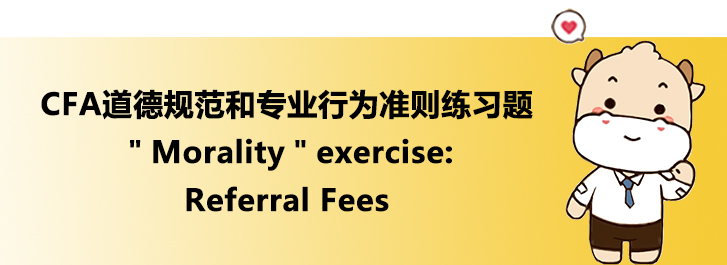CFA职业道德与专业行为标准(CFA Ethical and Professional Standards)向来是CFA一级和CFA二级考试的重点之一(CFA一级的比重达15%)。
在CFA考试中,涉及到职业道德与专业行为标准的考题往往最先出现。迅速并准确解答这部分考题,不仅有助于从考试开始就建立起信心,也能提高通过考试的机率。
CFA道德规范和专业行为准则练习题"Morality"exercise:Referral Fees
Questions 1:
Alexandra Zagoreos, CFA, is the head of a government pension plan. Whenever Zagoreos hires a money management firm to work with the pension plan, she finalizes the deal over dinner at a nice restaurant. At these meals, Zagoreos also arranges for the money manager to provide her payments equal to 10% of the management fee the manager receives from the pension plan with no formal documentation of this agreement. Zagoreos keeps half of the payments for her own use and distributes the remainder as cash incentives to a handful of her most trusted staff. Zagoreos least likely violated which of the following CFA Institute Code of Ethics and Standards of Professional Conduct?
A 、Referral fees.
B 、Loyalty, Prudence and Care.
C、 Additional Compensation Arrangements.
【Answer to question 1】A
【analysis】
A is correct as the money should not be accepted without receiving written consent from all parties involved; therefore, Zagoreos is in violation of Standard IV(B)–Additional Compensation Arrangements. The manager has acted for her own benefit by receiving compensation that competes with or might reasonably be expected to create a conflict of interest with her employer’s interest without receiving written consent from all par�ties involved. This action is a violation of Standard III(A)–Loyalty, Prudence, and Care, which requires that members act for the benefit of their clients, and places their client’s interests before their employer’s or their own interests. However, there is no indication that the member has received compensation, consideration, or benefit received from, or paid to, others for the recommendation of products or services and therefore has not violated Standard VI(C) related to referral fees.
B is incorrect because the manager has acted for their own benefit by receiving com�pensation that competes with or might reasonably be expected to create a conflict of interest with her employer’s interest without receiving written consent from all partiesinvolved. This action is a violation of Standard III(A)–Loyalty, Prudence, and Care, which requires that members act for the benefit of their clients, and places their client’s interests before their employer’s or their own interests.
C is incorrect as the manager has accepted compensation that competes with or might reasonably be expected to create a conflict of interest with her employer’s interest without receiving written consent from all parties involved, in violation of Standard IV(B)– Additional Compensation Arrangements.
Questions 2:
Florence Zuelekha, CFA, is an equity portfolio manager at Grid Equity Management (GEM), a firm specializing in commodities. Zuelekha, who previ�ously focused on alternative energy, recently attends her first commodity con�ference, sponsored in large part by GEM. Independent industry experts argued that commodities would increase in value and recommended that investors hold at least 10% of their portfolio assets in commodities based on consistent increases in their values over the previous two years. Without doing any additional research, Zuelekha recommends to all her clients an immediate allocation of 5% of their portfolio into commodities. Over the next few weeks, Zuelekha moves her own portfolio to a 10% commodity allocation. Which of the CFA Standards did Zuelekha most likely violate?
A、 Priority of Transactions.
B、 Independence and Objectivity.
C、 Diligence and a Reasonable Basis.
【Answer to question 2】C
【analysis】
C is correct, as Standard (V)–Diligence and a Reasonable Basis requires members and candidates to have a reasonable and adequate basis, supported by appropriate research and investigation, for any investment analysis, recommendation, or action. Relying solely upon attendance at a one-day conference listening to industry experts to make an investment recommendation, especially when the industry experts have based their recommendations upon price data only, would not meet the requirements of the Code and Standards with regard to Diligence and a Reasonable Basis.
A is incorrect because there has not been a violation of this standard.
B is incorrect, as even though the portfolio manager has allocated a portion of her portfolio to an asset class she recommended for clients there has not been a violation of this Standard since the manager has not front run any of her clients.
版权声明:本条内容自发布之日起,有效期为一个月。凡本网站注明“来源高顿教育”或“来源高顿网校”或“来源高顿”的所有作品,均为本网站合法拥有版权的作品,未经本网站授权,任何媒体、网站、个人不得转载、链接、转帖或以其他方式使用。
经本网站合法授权的,应在授权范围内使用,且使用时必须注明“来源高顿教育”或“来源高顿网校”或“来源高顿”,并不得对作品中出现的“高顿”字样进行删减、替换等。违反上述声明者,本网站将依法追究其法律责任。
本网站的部分资料转载自互联网,均尽力标明作者和出处。本网站转载的目的在于传递更多信息,并不意味着赞同其观点或证实其描述,本网站不对其真实性负责。
如您认为本网站刊载作品涉及版权等问题,请与本网站联系(邮箱fawu@gaodun.com,电话:021-31587497),本网站核实确认后会尽快予以处理。


 更多服务
更多服务












